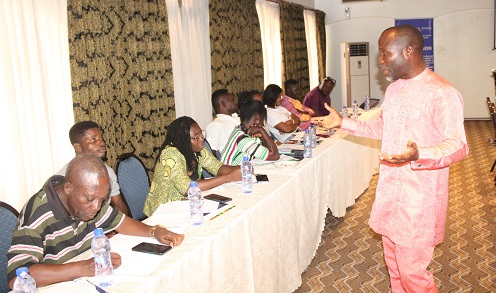
A person living with the Human Immunodeficiency Virus (HIV), Reverend John Kworshie Azumah, has advised Ghanaians against the stigmatisation of persons living with the virus.
Rev. Azumah, who has lived with the virus for the past 23 years, said stigmatising such people exposed them to all sorts of hazards, and in some cases led to their early demise.
He reiterated that carriers of HIV were not “death agents or doom orchestrators” who transmitted the virus through whatever they handled or were involved with.
Rev. Azumah was speaking on HIV stigmatisation at a capacity building workshop for media personnel on “Gender-Based Violence and HIV causing Stigma in our Society” in Accra on Friday.
The workshop was organised by the International Network of Religious Leaders Living with or Personally Affected by HIV and AIDS (INERELA+), a global inter faith network.
Rev. Azumah explained that such persons could over time, with the intake of the antiretroviral drugs and other medications, make the virus less detectable and thereby less transmittable.
As such, he stressed that people living with the virus could marry a HIV negative person who would not be affected, as far as the infected took his or her medications.
Rev. Azumah also advised persons living with the virus to accept their condition and take their medications, and also used the opportunity to advise journalists to avoid the sensationalism regarding the reportage of such cases, as such affected victims tremendously.
Speaking on “Using the Pen to Save Lives: Mental Healthcare for Survivors of Sexual and Gender-Based Violence (SGBV)”, Paulina Louisa Essel, a Certified Counselling Psychologist with the Commission on Human Rights and Administrative Justice (CHRAJ), indicated that SGBV was discriminatory and an obstacle to gender equality.
Again, she stated that SGBV affected everyone and was underreported for which reason journalists were to report on them, and handle survivors with “empathy and professionalism”.
Mrs Essel encouraged journalists to avoid being judgemental, remain calm, maintain eye contact, control their emotions, listen actively and reassure survivors of SGBV as well as acknowledge their grievances.
The Director of Public Education, CHRAJ, Mrs Nana Amua- Sekyi, in a presentation on early and forced marriages, said early child marriages were caused by poverty, teenage pregnancy, traditional beliefs, lack of education and gaps in law enforcement.
She said such marriages made children traumatised, vulnerable to Sexually Transmitted Diseases (STDs), early widowhood and increased their cycle of poverty.
Mrs Amua-Sekyi, therefore, urged journalists to respect the rights and privacies of children when engaging them.
BY ABIGAIL ARTHUR AND CECILIA LAGBA






